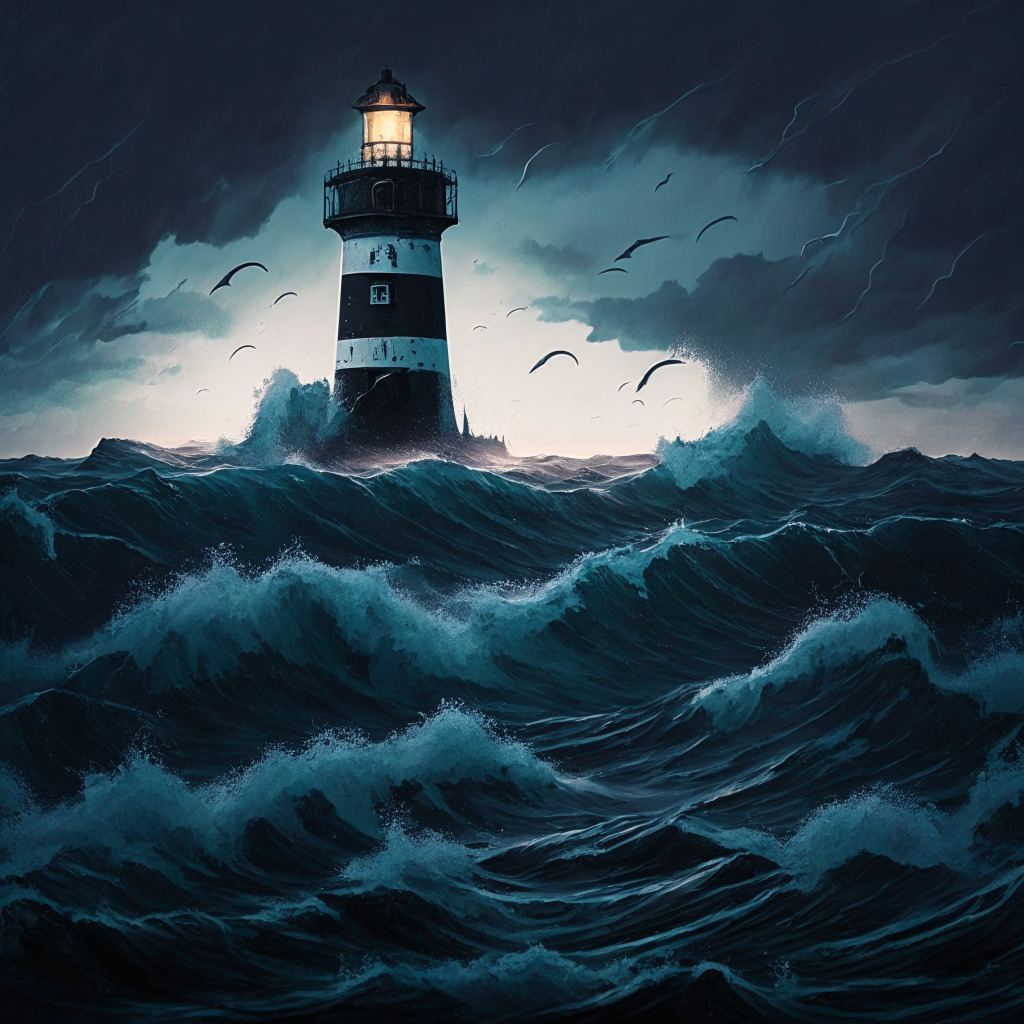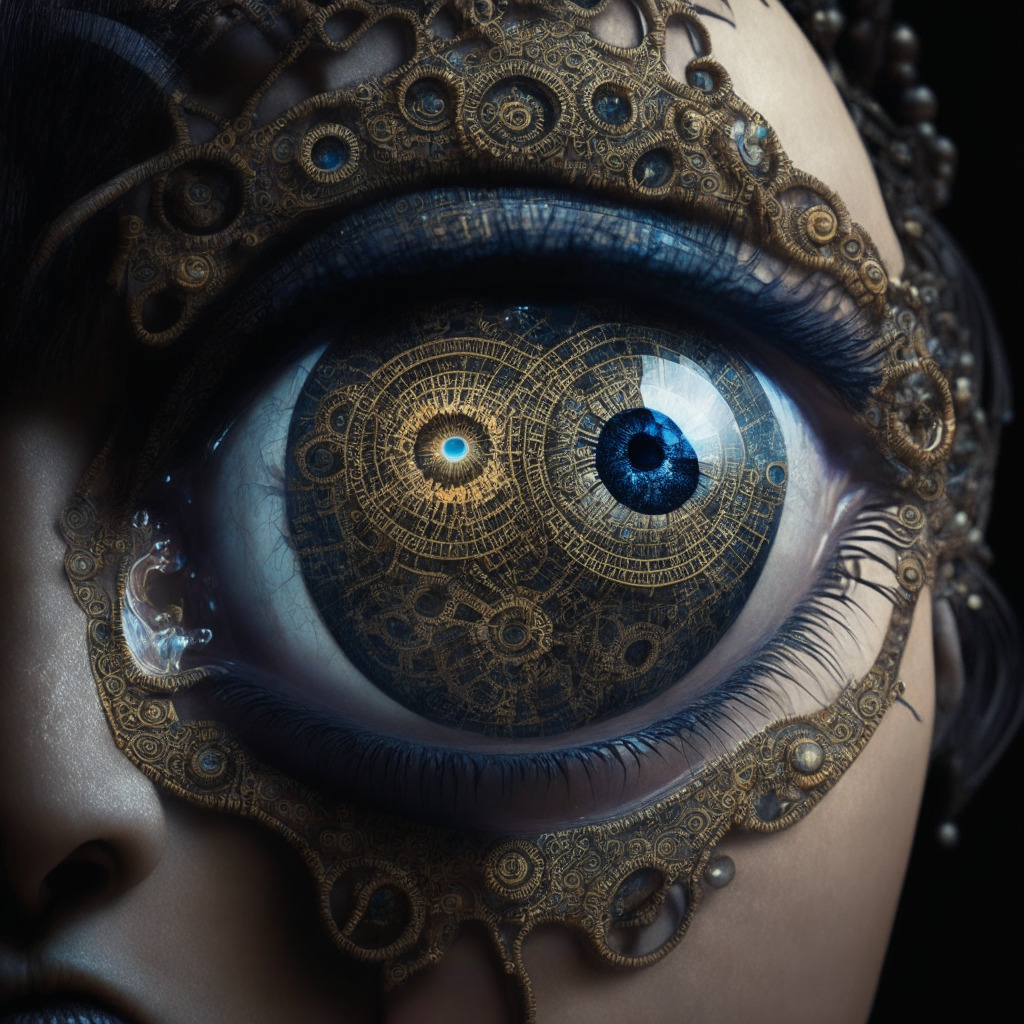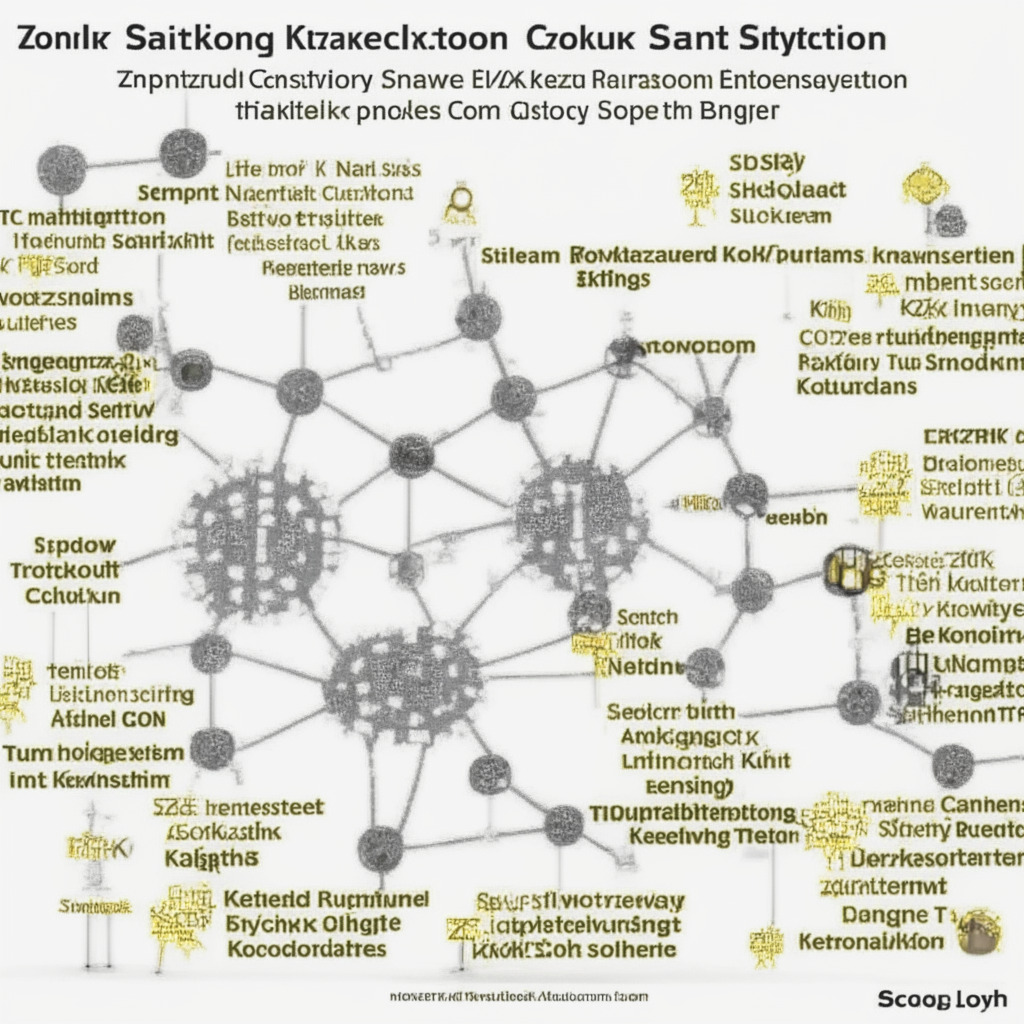“Blockchain technology introduces Leased Proof-of-Stake (LPoS), an innovative mechanism aimed at overcoming crypto mining complications. LPoS allows tokenholders to lease their tokens to validator nodes, improving their chance at generating new blocks and sharing transaction fees. While offering benefits such as decentralization and fixed tokens, LPoS also maintains control by restricting trade or transfer of leased tokens.”
Search Results for: PROOF
Watching Ethereum’s Unfold: ETF Applications, Market Manipulation, and the Shift to Proof-of-Stake
“Investment giants, Invesco and Galaxy Digital, are reportedly seeking regulatory approval for their spot Ethereum ETF. This follows prior similar requests like ARK 21Shares and VanEck. The introduction of Ether futures offers traditional investors access to crypto-assets and risk diversification, despite potential market manipulations and challenges in the regulatory approval process.”
Blockchain’s Leap to Outer Space: NASA’s Moon Mission and the Proofs in Data Cubes
“NASA is planning to use blockchain technology to verify its upcoming Moon landings. In partnership with Lonestar and the Isle of Man, NASA will launch a “data cube” payload in February 2024 verifiable using blockchain. If successful, this could change the course of space exploration and blockchain technology.”
Gaming Revolution via Blockchain: Proof of Play’s $33M Gamble: Rewarding or Risky?
“Farmville co-creator, Amitt Mahajan, backed by Proof of Play, has secured $33M to develop Web3 games, aiming to revolutionize the gaming sector with blockchain technology. The venture aims to facilitate smooth gameplay and promote decentralization but faces potential complexities and risks of emerging technology.”
Unearthing the Past: Zero-Knowledge Proofs, Hal Finney, and the Future of Blockchain
A rediscovered video of early Bitcoin pioneer, Hal Finney, discussing zero-knowledge proofs, a cryptographic principle now integral to blockchain technology, provides insight into the early workings of Bitcoin and Satoshi Nakamoto. Finney’s contribution to privacy-enhancing technologies, including the anonymous email system and Proof of Work system, underpin today’s blockchain infrastructure.
Ethereum’s Bumpy Journey: From Proof-of-Work to Proof-of-Stake and Beyond
A pivotal upgrade known as the Merge transitioned Ethereum from a proof-of-work (PoW) consensus mechanism to a proof-of-stake (PoS), causing a net supply decrease of 299,922.50 ether. The PoS mechanism needs users to hold ether to validate transactions and earn rewards. This eliminated much miner supply and made Ethereum more eco-friendly. However, despite these changes, ether’s market values have stagnated.
Ethereum’s Proof-of-Stake Transition: A Year in Review and a Look into the Future
“Ethereum transitioned to the proof-of-stake system reducing power consumption by over 99% and making the network economically deflationary. However, anticipated price surge due to deflationary pressure hasn’t materialized swiftly. Liquid staking providers control significant amounts of staked Ether, raising potential centralization concerns.”
Arbitrum’s Unused Fraud Proofs: A Testament to Security or Flawed Utilization?
“In the blockchain technology stakes, maintaining security and preventing fraudulent activity is key, with protocols like Arbitrum’s fraud proofs playing a significant role. Surprisingly, according to Offchain Labs, these fraud proofs haven’t been used since the protocol’s launch two years ago, due to a combination of strong deterrent measures and the risk to validators.”
Balancing Financial Regulation and On-Chain Privacy with Zero-Knowledge Proofs
Ethereum co-founder, Vitalik Buterin, proposes the use of zero-knowledge proofs (ZK-proofs) for ensuring financial compliance and privacy in the blockchain world. This method can verify claim affirmations without divulging all transaction details, thus balancing anonymity and accountability. However, acceptance and successful execution within the blockchain community and regulatory bodies will determine the viability of this potential revolution in blockchain technology.
Breaking Boundaries with Zero Knowledge Proofs: Andreessen Horowitz’s Lasso and Jolt Projects Unveiled
Andreessen Horowitz recently unveiled two innovative open-source projects, Lasso and Jolt, centered around zero-knowledge proofs – a robust form of cryptography. These initiatives aim to enhance transaction speed, cut costs, boost privacy, and empower external developers, introducing new opportunities to scale blockchain networks.
Decoding the Andrew Horowitz Bet on ZK Proofs: Unlocking Blockchain’s Future or Unlocking Concerns?
Venture capital firm Andreessen Horowitz (a16z) is investing in the development of zero-knowledge (ZK) proofs and open-source software projects, Lasso and Jolt, aiming for scaling blockchains while preserving transaction privacy. These technological advancements may transform blockchain’s scalability and privacy, but could also introduce new vulnerabilities and challenges.
Binance’s Crypto Conversion Controversy: An Analytical Dive into Their Recent Proof-of-Reserves Report
Binance’s proof-of-reserves report reveals a major drop in its USDC reserves from $3.4 billion to $23.9 million within a month. The plunge was intensified due to the strategic shift of its USDC to Binance USD (BUSD), and the acquisition of prominent cryptocurrencies like BTC and ETH. Despite conjecture, Binance maintains a healthy financial state.
Unveiling a Tamper-Proof Future: The Revolution of Data Security in Blockchain with Zero-Knowledge Proof
“Space and Time, a decentralized Web3 data service, has launched a tool powered by Zero-knowledge proof technology for SQL queries. The company’s Proof of SQL ensures data integrity in its decentralized network, enhancing data security for retail, finance, gaming, and blockchain-based solutions.”
Unraveling the Mystery of Zero-Knowledge Proofs: A Double-Edged Sword in Crypto Privacy
“Zero-knowledge proofs (ZK-proofs), cryptographic protocols that authenticate transactions without disclosing specifics or user identities, play a significant role in improving the privacy and scalability of cryptocurrency transactions. However, aspects like verifying protocol, potential security flaws and facilitating illegal activity present challenges to their wide adoption.”
Worldcoin’s Proof of Security Amid Biometric Criticism: A Necessary Evil or Orwellian Nightmare?
“Worldcoin, known for its proof of humanity protocol, faced criticism over data collection practices. Post security audits by Nethermind and Least Authority, 24 out of 26 identified issues were resolved. Unaddressed issues remain a concern despite progress in addressing challenges for this biometric security and blockchain blend.”
DeFi’s $39M Loss Fuels Rise of ZK-Proofs: A Game-Changer or Mask for Dark Exploits?
“The DeFi sector has been shaken by substantial losses due to cyberattacks, stirring interest in zero-knowledge-proof (ZK-proof) technology. This tech allows for encrypted, private transactions without revealing sensitive details, improving transaction speed and security. However, it may hinder industry transparency and has implementation challenges.”
Unmasking Worldcoin: The Human-AI Interface and the Quest for Proof-of-Personhood
Worldcoin, a new crypto project, operates on the principle of proof-of-unique-personhood to prevent deep-fake bots. Despite rapid engagement, concerns about potential Orwellian surveillance and exposure of sensitive biometric data have arisen. Advocates argue that the collected data is converted to untraceable hash codes and no raw human data is stored. Ethereum founder Vitalik Buterin underscored the risk of centralized models not fully safeguarding data.
Ethereum’s Switch to Proof-of-Stake: A Sustainable Step or a Misdirected Move?
“Ethereum’s shift from proof-of-work to proof-of-stake, known as the “Merge”, is viewed differently by stakeholders. While the move reduced Ethereum’s energy demands and is hailed as a ‘green’ shift, it overlooks the ongoing significant energy consumption from graphics processing units previously used in mining. Moreover, perspectives on security and profitability under the new system remain contentious.”
Vitalik Buterin Probes Worldcoin’s ‘Proof-of-Personhood’ Amid Conceptual Hurdles
Ethereum’s co-founder, Vitalik Buterin, has voiced his concerns about Sam Altman’s new crypto project, Worldcoin. Buterin scrutinized Worldcoin’s novel ‘Proof-of-Personhood’ system, expressing apprehensions on privacy, accessibility, centralization, and security issues related to iris scanning technology known as ‘World ID.’
Merging AI and Zero Knowledge Proofs: Skyrocketing Blockchain’s Future or a Risky Endeavor?
“Blockchain technology combines with zero-knowledge proofs (ZK-proofs) and AI for improved smart contract solutions. Despite challenges, experts remain optimistic about its future. Integration of ZK-proof with AI hints at a transformative occurrence that continues shaping blockchain’s promising future.”
Exploring ZK Proofs: Privacy Panacea or Another Layer of Web Complexity?
“ZK proofs, or zero-knowledge proofs, are cryptographic measures that could solve internet users’ privacy concerns. They secure data from the onset, only revealing essential aspects, potentially reshaping the internet framework. However, they may also add to the complexity of online security measures.”
Rapid Scaling of Ethereum: Harnessing the Power of ZK-Proofs and the Challenge of Off-chain Computations
“The Ethereum ecosystem is encouraging competition, with many firms developing Zero-Knowledge Scaling solutions. This technology enables secure off-chain computations and only light, non-data-revealing proofs on the Ethereum mainnet. Despite its efficiency, questions arise about the sustainability and security of off-chain transaction computations.”
Bolstering Blockchain: The Integration of ZK Proofs in Cryptographic Technologies
This article discusses the partnership between Paris-based =nil; Foundation and Fabric Cryptography as they work together to enhance cryptographic technologies and accelerate the deployment of zero-knowledge (ZK) proofs – a cryptographic procedure with substantial privacy-preserving attributes. They aim to overcome barriers in computation, making ZK proofs more functional for digital transactions, cloud services and privacy applications.
Chainlink’s Proof-of-Reserves: True Transparency or Illusion of Accountability?
Chainlink’s proof-of-reserves service promises to allow crypto custodians to directly monitor real-world assets on blockchains, increasing safety and transparency for DeFi users. However, the durability of this solution is questioned as the credibility of data depends on the source, possibly masking inadequate accounting practices and reinforcing trust issues in centralized entities.
Teleporting Assets: Storage Proofs Revolutionize Cross-Chain Transfers and Security
Storage proofs, a cryptographic method aiming to revolutionize cross-chain asset transfers, may provide a more secure alternative to vulnerable bridges in the growing blockchain ecosystem. Starknet plans to be the first network to natively integrate storage proofs, potentially eliminating intermediary third-party “oracles,” offering enhanced security and user experience for asset transfers.
DOJ Charges in Mt. Gox Hack: A Milestone for Crypto Security or Proof of Industry’s Vulnerability?
The DOJ recently charged two Russian nationals for hacking Mt. Gox in 2011, stealing 647,000 BTC. This highlights the ongoing debate within the crypto community regarding safety and regulation, as the industry remains vulnerable to hacking and fraudulent activities.
Unlocking Blockchain’s Potential: Zero-Knowledge Proofs, Privacy, and Regulatory Challenges
Blockchain needs its SSL equivalent to become genuinely useful. Zero-knowledge cryptography may unlock blockchain’s full potential in a secure and compliant manner while preserving user privacy. However, achieving the right balance between privacy and transparency is crucial for mainstream adoption.
Green Proofs for Bitcoin: Incentivizing Sustainable Mining Practices and Balancing Criticism
Green Proofs for Bitcoin, launched by Energy Web, aims to incentivize sustainable practices in the bitcoin mining industry. By offering transparency into companies’ decarbonization initiatives, it bridges the gap between sustainable miners and potential investors, encouraging a more environmentally friendly future.
Green Proofs of Bitcoin: A Step Towards Sustainable Crypto Mining and Transparency
Energy Web has launched the Green Proofs of Bitcoin (GP4BTC) registry, aiming to address environmental concerns by tracking miners’ energy inputs and their impact on electric grids. The registry evaluates miners on renewable energy credit purchases and participation in demand response programs, promoting transparency in their energy sources and supporting a greener crypto industry.
Texas Crypto Bill: Proof of Reserves Debate and the Quest for Transparency
The Texas legislature passed HB-1666, aiming to increase financial transparency among digital asset service providers like Binance. The bill requires cryptocurrency exchanges serving over 500 customers or managing above $10 million in customer funds to maintain sufficient reserves and report to the state. Texas lawmakers also updated the state’s bill of rights to include residents’ rights to own and use digital currency.
Ethereum’s Proof of Stake Future: The Impact of Standardized Staking Rates and New Financial Products
The development of a standardized Ethereum staking rate benchmark, representing daily, annualized mean of on-chain rewards, could impact the cryptocurrency landscape. This rate could unlock the next generation of financial products and serve as a building block for Ethereum’s monetary policy, providing reference rate utility for market participants, and enabling risk transfer tools like swaps and futures.
Scaling Bitcoin With zk-Proofs: A Solution to Network Congestion and Transaction Fees?
The Bitcoin network faces congestion and increased transaction fees due to the demand for BRC-20 tokens. Zero-knowledge proofs (zk-proofs) may help address these issues by enhancing privacy, security, and blockchain capacity. Projects such as ZeroSync are exploring solutions like zkCoins to increase transaction throughput and improve network scalability.































